13 Classic Board Games that Became a Movie or TV Series
Thirteen board games that reached the silver screen!
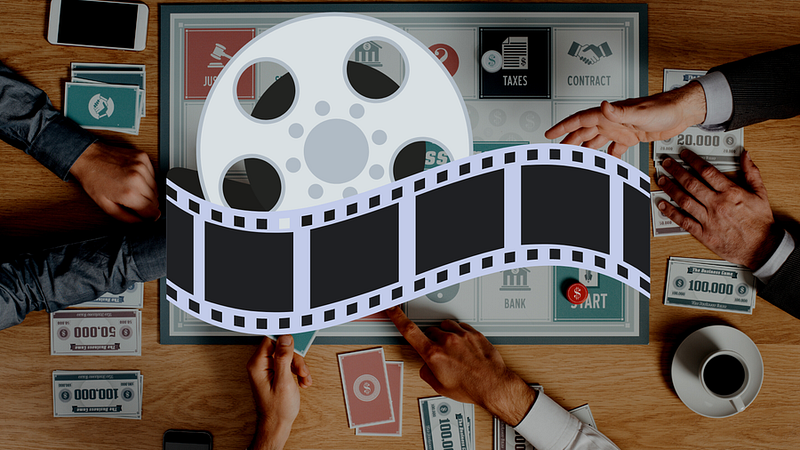
Board games have been a staple of human civilization for at least the last 7,000 years, with dice discovered in burial grounds in what is modern-day Turkey. The ancient Egyptian royalty, too, loved board games, with the Egyptian game Senet being the oldest known complete board game (though its rules have been lost to the ages)…
Since the early 1900s, however, games have blossomed worldwide, expanding into what is now a thematic industry driven by concepts like art and story as much as by clever rules.
With so many great games to draw from, the progression from game concept to fully-fledged stories seems natural.

There aren’t as many films or shows based on board games as there are board games based on movies, but there are a few. For some others, the documentaries exploring their histories and modern-day players are about as dramatic as any Hollywood hit.
Here are the board games that became either movies or TV shows!
Board game: Clue
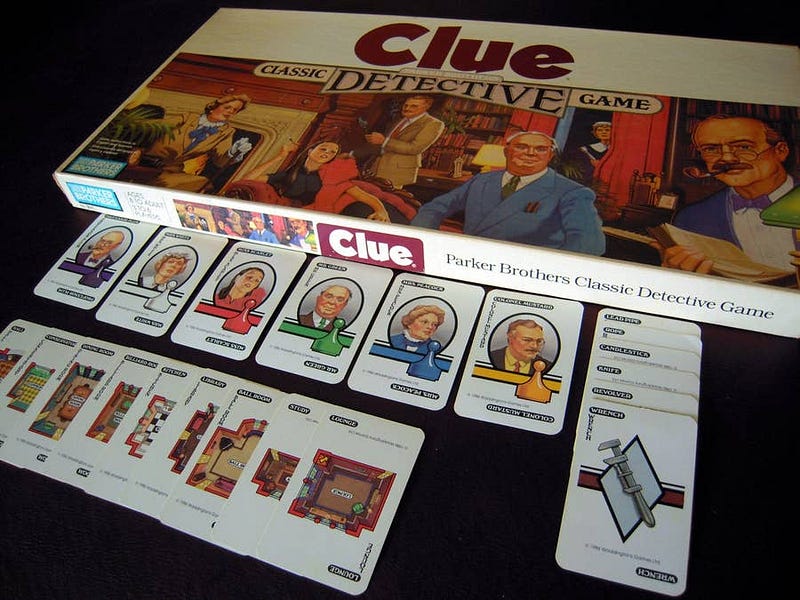
In 1944, a man named Anthony E. Pratt filed the first patent for the game that would become Clue. A musician and composer by trade, Pratt spent time during WWII working in a plant that manufactured parts for tanks.
While his factory work was less than thrilling, it did give him time to think about his experiences playing concerts at country hotels in his pre-war life, hotels where the after-dinner game of choice was often the soling of a mystery.
Pratt, a massive fan of the detective fiction of the era, including Agatha Christie and Raymond Chandler, combined his own experiences with a larger thematic concept and, together with his wife Elva, designed a board game based around murder and mystery.
Not all game designers end up happy after a corporation buys their game, but in 1953 the company that sold the original version of Clue (called Cluedo) offered him a sum equivalent to over $100,000 for the overseas rights. Both he and Elva lived long, full lives, with Pratt continuing to play music and read detective fiction in his spare time.

Movie: Clue (1985)
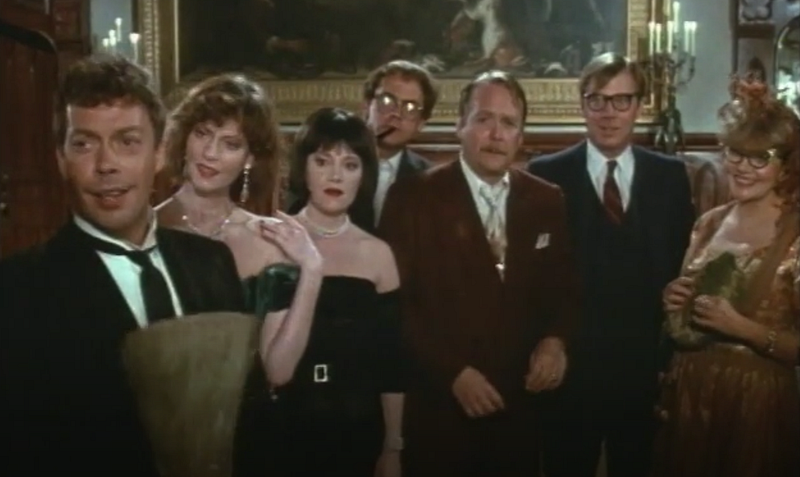
Starring Tim Curry, this film became a cult classic that everyone can enjoy. Set in the aesthetically perfect “Hill House,” seven guests and a maid find themselves surrounded by murder.
Each character is named explicitly for a character from the Clue board game (Professor Plum, Colonel Mustard, etc.). The mystery of the killer is unraveled via dark and bawdy slapstick antics that keep the audience stuck to the screen.
Board game: Killer: the Game of Assassination
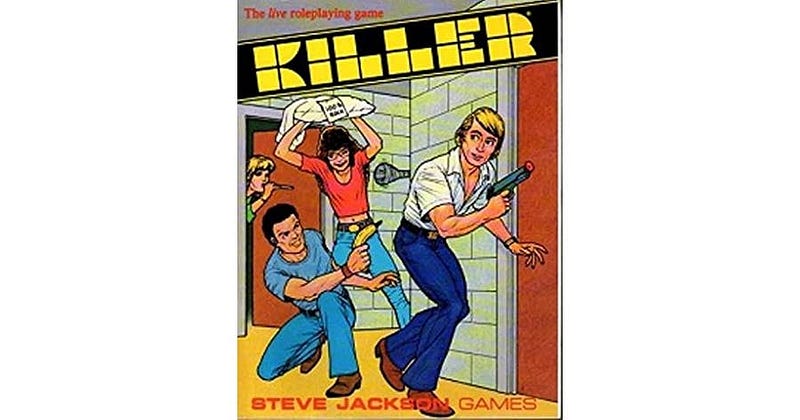
In 1982 Steve Jackson Games released Killer: the Game of Assassination. Not actually a board game, per se, Killer was a proto-LARP (live-action roleplaying game) where the rules were placed in an easy-to-read booklet, and the “game pieces” were the players themselves.
Movie: Gotcha! (1985)
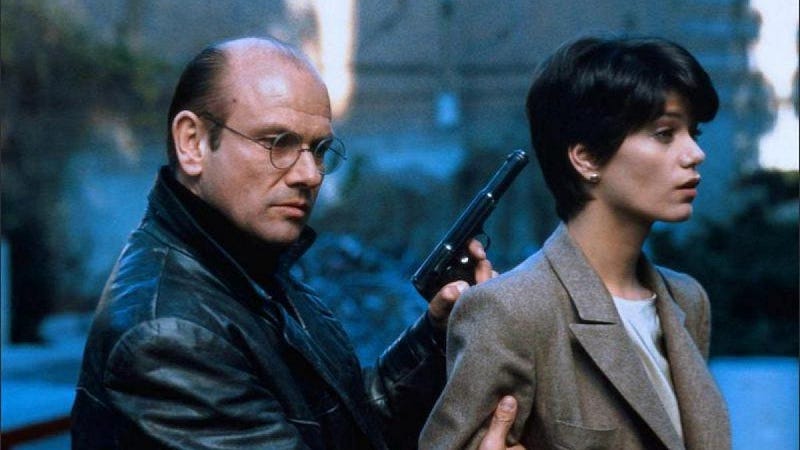
It’s all fun and games until the paintball guns get switched for the real thing. The film revolves around a student named Jonathan who plays a campus-wide game of Gotcha! where he and his fellow students attempt to “assassinate” the others.
But, unknown to him, a vacation in Europe puts him on the radar of East German spies, who believe he has secrets they desperately need.
This begins a very real version of Jonathan’s favorite game, one that he had better score high at, if he wants to survive… it’s all as ridiculous as it sounds and manages to poke fun at a lot of the Cold War paranoia that ran rampant at the time.

Board game: Dungeons & Dragons
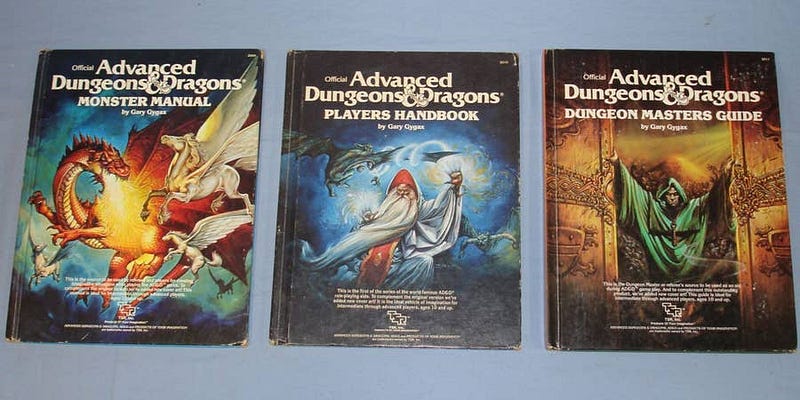
There are few games more historic than Dungeons & Dragons, which spawned not only a whole host of imitators, but plenty of amazing multimedia content as well.
In D&D, players take on the “role” of a character that they themselves have designed, using rules found in large compendium rulebooks. The options are wide, allowing players to create a vast range of fantasy-trope characters, which they then roleplay within a setting and story managed (and often created) by another player known as the Dungeon Master.
It’s an exercise in teamwork, imagination, basic mathematics, and theatrical improvisation, and I honestly think that all schools should have a mandatory class in it.
There have now been a few films that claimed the Dungeons & Dragons name, but none of them managed it half as well as the 2000 film.
Movie: Dungeons & Dragons (2000)
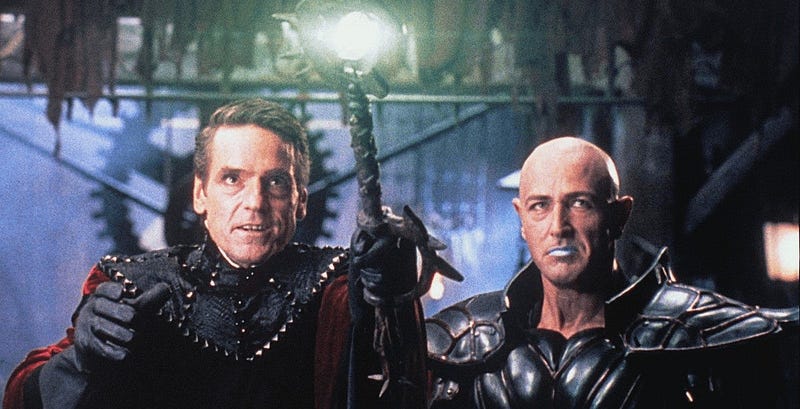
I honestly love this film, and not just because it manages to perfectly encapsulate everything about what it’s like to imagine a game Dungeons and Dragons far better than any other movie around… it’s also just a really fun film, with a great cast and some delightful writing, perfect for a slightly campy movie night with a big bowl of popcorn.
Profion, played by the brilliant Jeremy Irons, is preparing to use the power of ancient dragons to lay low the shaky rule of the young Empress Savina.
But lady luck intervenes, and two wily best-friend thieves make off with the secret to this power, alongside a young prudish mage and a surely dwarf, and aided by an elven warrior maiden. Bruce Payne, who plays Profion’s henchman Damodar, deserved an Oscar for his role.
Movie #2: The Gamers: Dorkness Rising
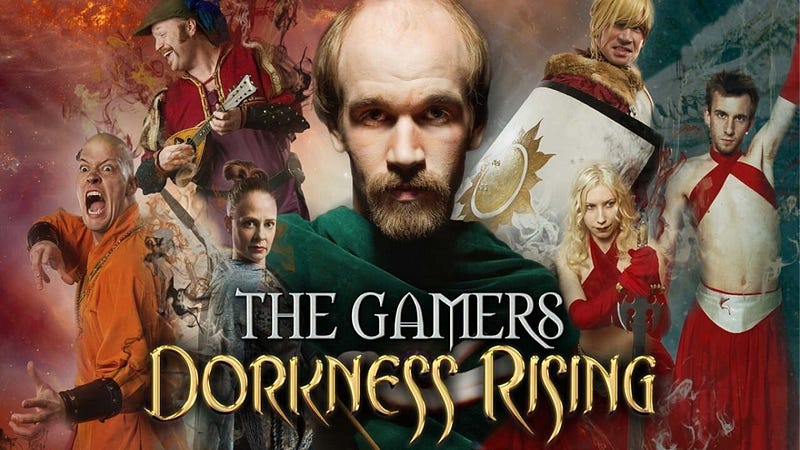
While the other D&D-based film on our list tackles the pure imaginative side of role-playing games, The Gamers: Dorkness Rising manages to do a brilliant job of telling a story about the real-world aspects, the gamers who get together and play the game.
It’s a funny and moving little indie film, with delightful special effects and a surprisingly moving storyline. While often absurd, the jokes are numerous and manage to toe the line between being too focused on the “in-crowd” of gamers and those who are watching uninitiated.
Board game: Chess

Chess has sparked its fair share of films in the past, but 2020 saw another flurry of attention sparked by the hit Netflix series The Queen’s Gambit. The world of chess mastery is far more fraught and dramatic than many unfamiliar with the game might believe.
Still, the game has long been a source of international attention, with players competing not just for a title but also for their entire country’s honor. It makes perfect sense, then, for a dramatic narrative to be pulled from this world, a great story based not on any one person but on the archetypes who are often found within the rank of the greatest players ever to live.
However, for those unfamiliar with chess terminology, the question of just what a “Queen’s Gambit” actually is, might be maddening.
Basically, the Queen’s Gambit is a move of control, an early game move that is both extremely common and somewhat risky (hence the gambit). Through this move, the player of white can force the player of black to either accept or reject the gambit move — with either choice creating a new series of potential moves that the player of white can now theoretically continue to try to direct and control.
Miniseries: The Queen’s Gambit (2020)
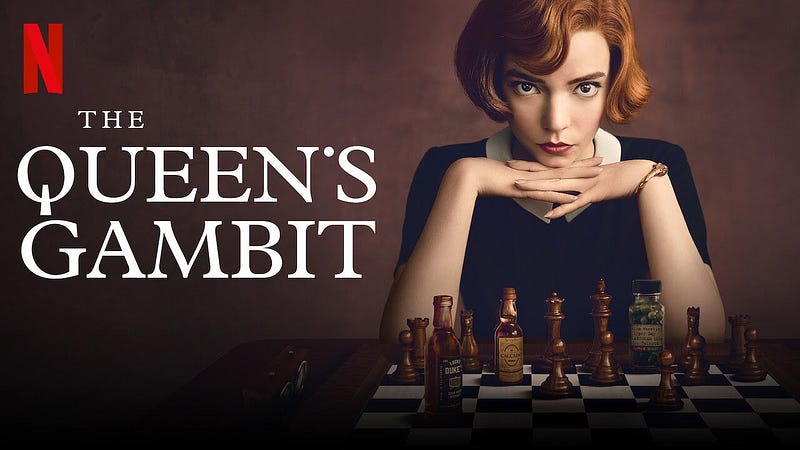
Centered on the fictional character Beth Harmon, The Queen’s Gambit is the tale of a girl chess prodigy who struggles with a personal dark side. Involved in alcoholism and drug addiction, results of her difficult childhood, she must fight through the experience of being a woman in a male-dominated era and professional field.
The show swept viewers off their feet and quickly became Netflix’s most-watched series, as well as being lauded by critics for its superb cinematography, acting, and costumes.
Board game: Go
Not as many people in Europe and the Americas have heard of or played Go as they have chess, despite that Go may very well be the oldest board game continuously played until modern times.
Invented in China over 2500 years ago, Go is a game of grand strategy involving the flow of territory on a board featuring a painted grid of black lines. Black stones and white stones are set on the board by two players and only removed when completely surrounded by stones of a different color.
Go is less about capturing pieces and more about spatial control. With more than 2.1 × 10 to the hundred and seventieth power possible legal positions, Go far outstrips the number of atoms in the visible universe. Until recent advances in super-computing, computers were unable to handle the sheer potential inherent in the chessboard.
Movie: The Go Masters (1982)
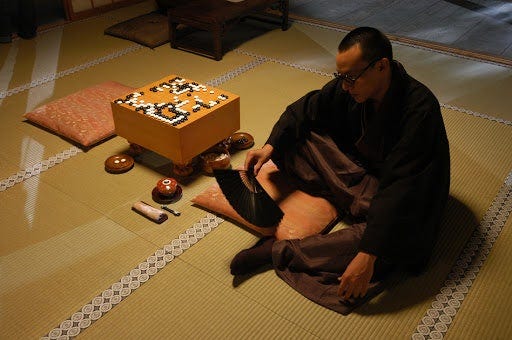
Go was one of the four essential arts considered a requirement for the aristocratic classes in ancient China. The game would later become incredibly popular within Japan and Korea. As such, it makes sense that the game would be a staple feature within dramatic narratives, where the inherent romance of the game’s history and associations could be applied to great effect.
One such film is The Go Masters (originally Mikan no taikyoku), which follows the life of a great Japanese Go player and his Chinese Go teacher, whose daughter he has started a family with.
When Japan invades China, the characters’ lives grow incredibly complex, and the choices that the hero must make will forever change his life and the lives of those he loves.
The Go Masters is a moving and emotional drama and a prime example of how games, culture, and politics are innately intertwined. It’s an absorbing human tale and one that cannot help but fail to strike a powerful chord.
Board game: Mahjong
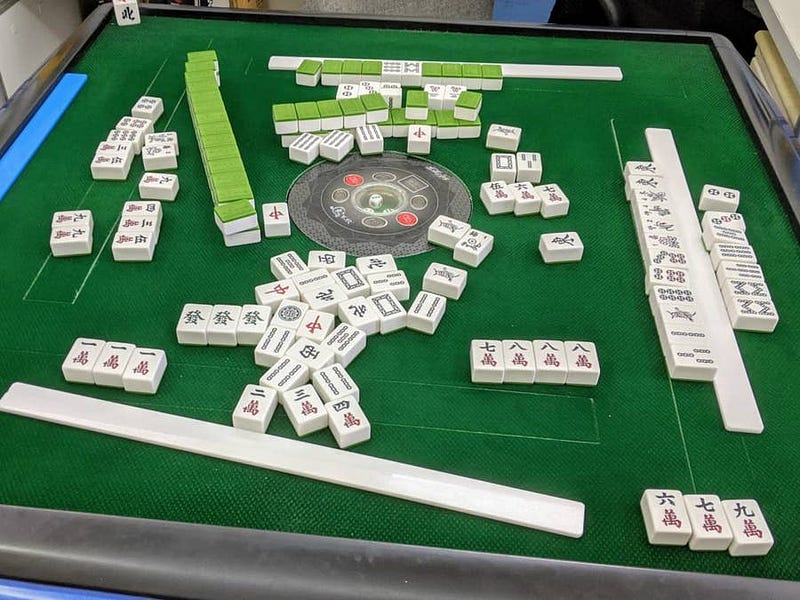
Mahjong is an incredibly popular game of Chinese origin that developed out of 18th and 19th-century card games and bears a striking resemblance to Western card games like Rummy.
During the 1800s, a transition took place, from the original cards used to play this type of game to tiles. A traditional gambling game, Mahjong was banned in China following the founding of the People’s Republic in 1949 alongside all other forms of gambling, but the game has since rebounded both in China and around the world.
It’s been popular in the West since the first sets were sold in the 1920s, and it’s proved itself well on electronic mediums, with gaming and gambling taking place online.
Given both its popularity and the pop-culture flair with which it is often associated, the game is primed for the screen, featured in many Asian films.
Movie: Kung Fu Mahjong 2 (2005)
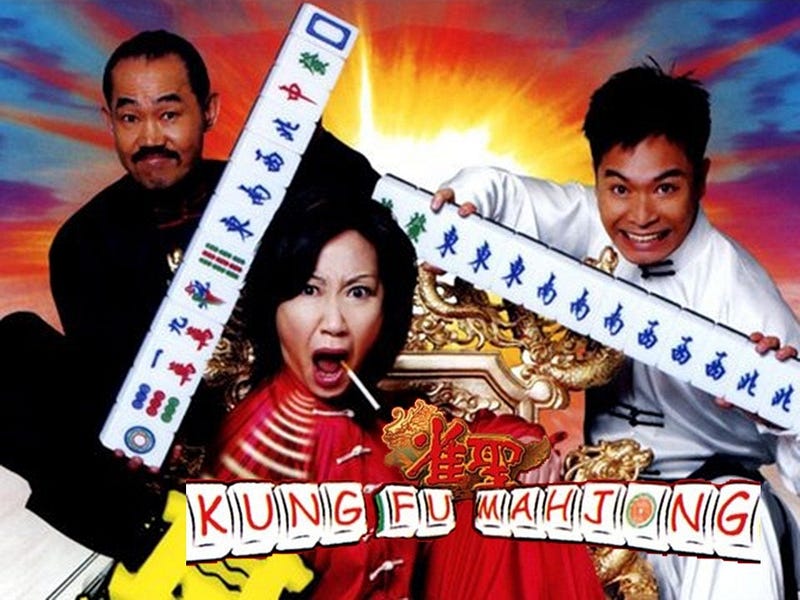
Fanny is a master Mahjong player trying to win back her husband, and the only way she can do that is by destroying the oddball competition at the “King of Mahjong” match. Luckily, she’s also a brilliant kung fu master, and she uses her martial arts skills to lay the beat-down on players who’ve cheated their way to the top.
It’s a very silly film that fits into a specific gene of low-budget Chinese kung fu comedies: irreverent and rather dumb, but perhaps not any more so than popular Western comedies in the same vein. It’s probably about as good a look into Mahjong culture as it’s possible to get, though, at least from the vantage of comedy.
Board game: Charades
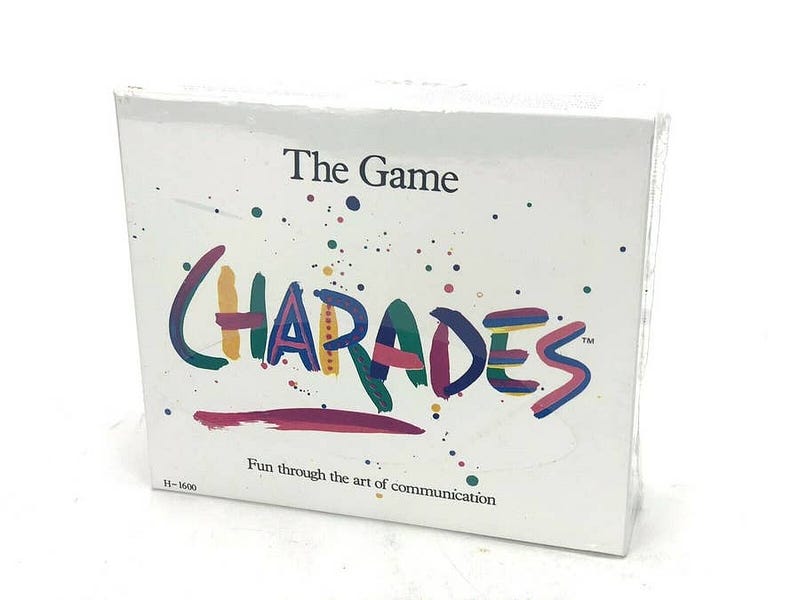
The game of charades is widely known around the world, but the version most commonly played today is not the version as it was originally conceived. Back in the 18th century, a “charade” referred to a type of literary riddle, such as this one composed by Jane Austin:
When my first is a task to a young girl of spirit,
And my second confines her to finish the piece,
How hard is her fate! but how great is her merit
If by taking my whole she affects her release!
It wasn’t until the 19th century that theatrically acted charades began to excite in France. Throughout World War I, this more active form became entrenched as the most popular version of the game, with written charades being primarily relegated to history.
Since then, it’s found its way into popular culture largely through game shows, where its visual form and frequent focus on making people look silly has gone over well with audiences.
Movie: Charade (1984)
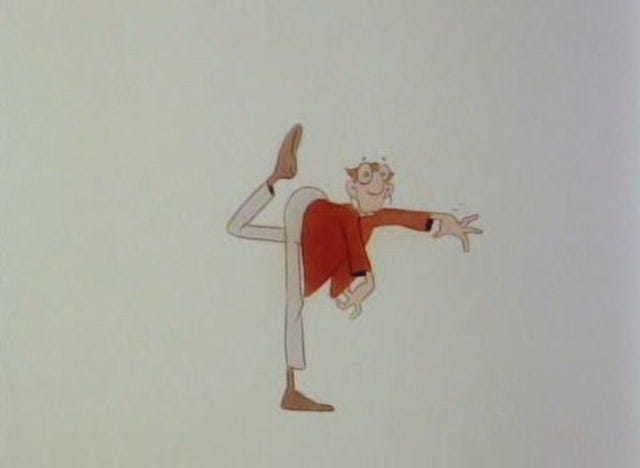
A greatly popular game in Britain as of the first world war, Charades made itself the natural template for some sort of media adaptation.
Given its innate comedic principles, charades found a perfect home within cartoon animation and the film Charade, where ever-greater slapstick is applied as the main character tries to get his companion to understanding the charade. It’s only five minutes long, true, but it’s five minutes grunteed to crack you up.

Board game: Scrabble
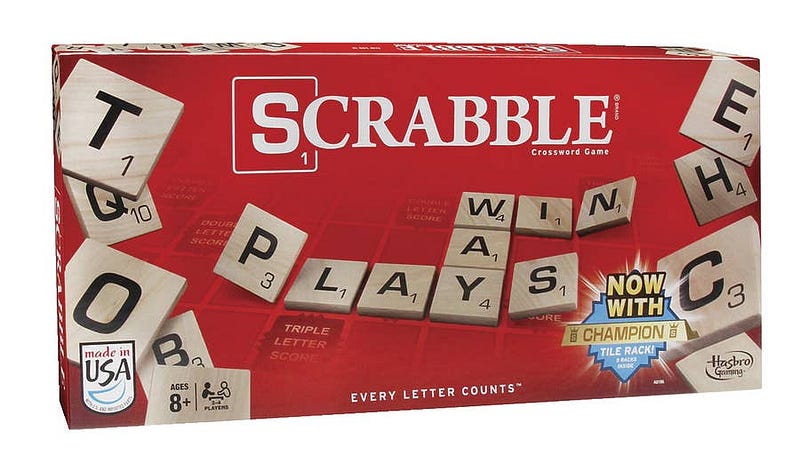
An out-of-work architect in the 1930s, Alfrid Butts set out to explore the possibility of creating his own board game. He drew upon crosswords and anagrams and studied various games, which he explored in writing in a 1931 paper.
While reading a short story by Edgar Allan Poe, he encountered a line featuring the letter distribution in the English language, and that sparked an idea for what would become a game named Lexiko (based on the greek word Lexicos which means “of words”).
When Lexiko failed to take off, Butts went on to evolve the mechanics into the game of Scrabble that we know today. By the mid-1950s, after finding new distribution channels, the game had sold over four million sets.
The game itself is quite simple, with players forming different words on a gridded board. Different letters are worth different points based on their frequency in the language (with the included numbers of certain letters also being based on their frequency and usefulness).
Players score points by creating new words from words already placed on the board, leading to large interconnected word patterns that can get quite complex by the late game.
Movie: Word Wars (2004)
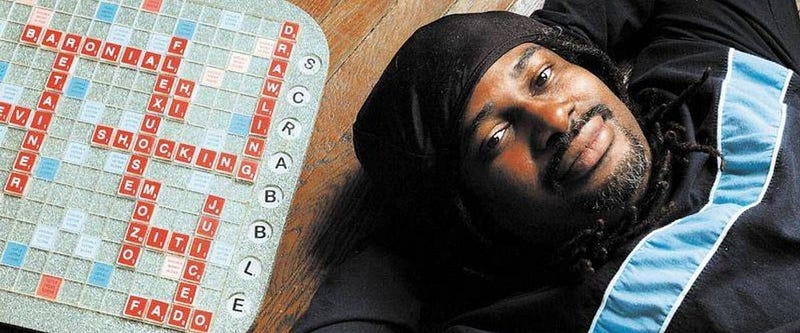
That I could find, Scrabble has yet to inspire any narrative films, but this 2004 documentary might as well be a comedy.
Taking a look at the cutthroat world of Scrabble enthusiasts is a little like looking into a madhouse mixed with a gambling den, but there’s also a playful sensibility that makes the whole thing fun, at least as a viewer.
It’s probably not a good idea to get between a hard-core Scrabble fanatic and their game board, but there’s something utterly fascinating about the seriousness with which some of these players play the game.
Board game: Battleship
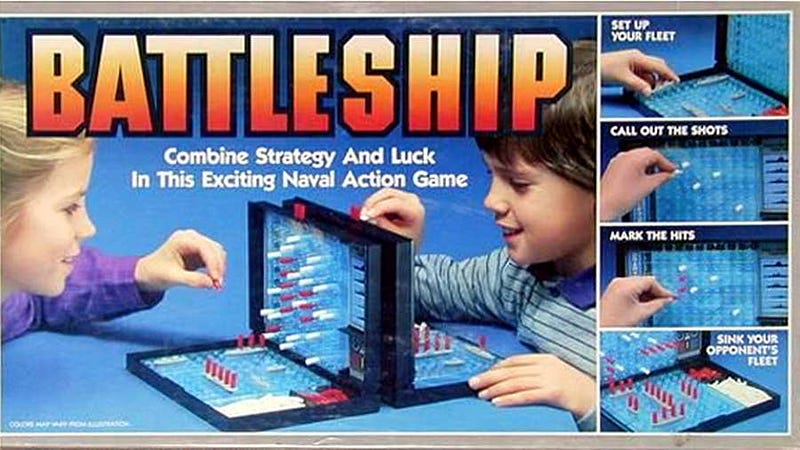
The exact origins of Battleship are unknown, but the game emerged somewhere around or just before World War I, with possible sources of inspiration coming from the French game that predated modern Stratego or from a similar 1890s American game that likewise featured a partitioned playing board where the opponent’s side was hidden from view.
In Battleship, players first place their “ships” on a grid and then take turns guessing which section of their opponent’s grid might contain a ship. Enough “hits” marked by correct guesses will sink a ship, with each ship taking up a different number of squares on the grid and therefore having a different number of available hits it can absorb.
Early versions of the game that became popular were actually pen and paper games, with specially printed pads of paper sold as the “game board.” It wasn’t until the late 1960s that a version of the game featuring a plastic board and pegs was developed.
Movie: Battleship (2012)
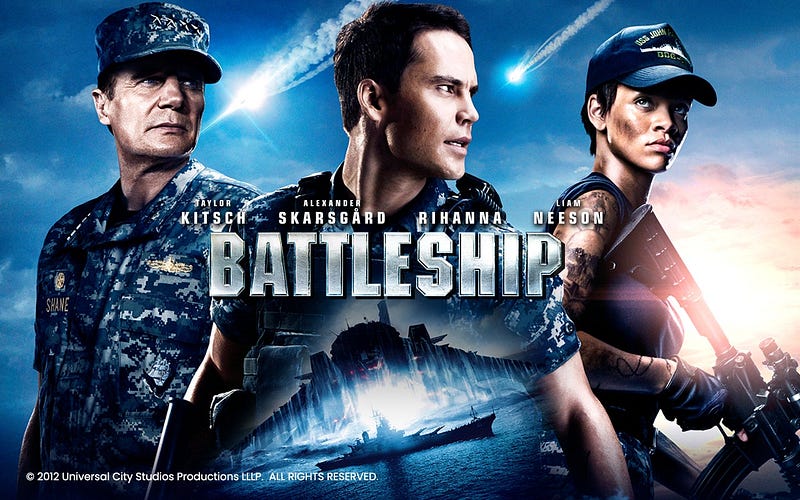
I only remember walking out of the movie theater before a film was finished once in my life, and that honor goes to this very same film. It was just so gosh-darn unbelievably bad and so hyped-up on military propaganda that I just couldn’t handle it.
That said, I did watch it with friends a few years later, and while my primary opinion of it didn’t change, I found out that it was a blast to watch with a group who liked to lampoon bad films in raucous form.
Since the basic premise of the game is so neutral, it’s conceivable that any number of interesting and intelligent stories could have been constructed using the Battleships gameplay, a method for restricting and structuring the plot… yet somehow, we ended up with waterlogged alien spaceships. Hollywood really fell overboard with this one; whoever cleared it for production needs to walk the plank because they totally missed the mark.
Board game: Ouija

When capitalism meets spirituality… capitalism patents, packages, and sells spirituality as fast as it can. While the core technique underlying the Ouija board (or talking board) has been identified as a psychological phenomenon by scientists, it has been believed to be a powerful magical technique since the 12th century in China.
Then, in 1980 an American businessman, noting the interest in talking boards from a rising spiritualist movement, realized that there was money to be made.
Elijah Bond took a planchette (the board on coasters that created the “automatic writing” effect) and printed an alphabet on it. He filed a patent for it and became the first successful inventor and entrepreneur of the Ouija board.
Movie: Ouija (2014)
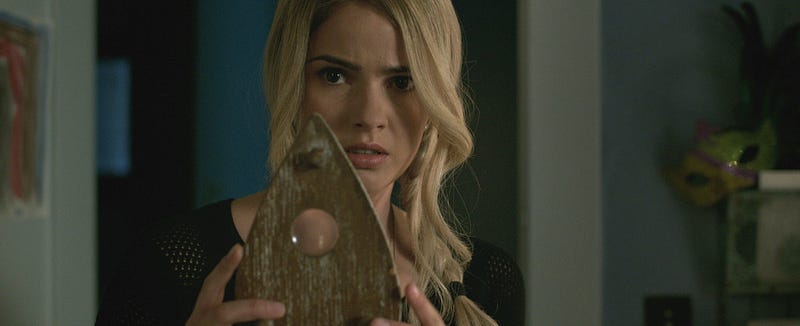
With deep roots in pseudo-scientific spiritualism, it follows that the horror genre would pick up on the Ouija board. Indeed, the board has been a featured staple in several films, but in 2014 we actually got a film named directly for the toy.
After recording herself playing with an ancient Ouija board, a girl is killed, and her closest friends feel compelled to investigate. Thinking she’s trying to communicate with them from beyond the grave, they soon learn that they’ve made a mistake, and something very dark has been lurking just beyond the thin veil of reality, waiting for its chance to strike.
Though ultimately as good as you’d expect, the film was a commercial success, going to show that people in 2014 were really bored. Given the remarkable 6% positive rating found on Rotten Tomatoes, it’s really incredible to think that the film managed to sell any tickets at all.
In 2001, Ouija boards were burned in Alamogordo, New Mexico, by fundamentalist groups alongside Harry Potter books as “symbols of witchcraft”
Board game: Magic: The Gathering
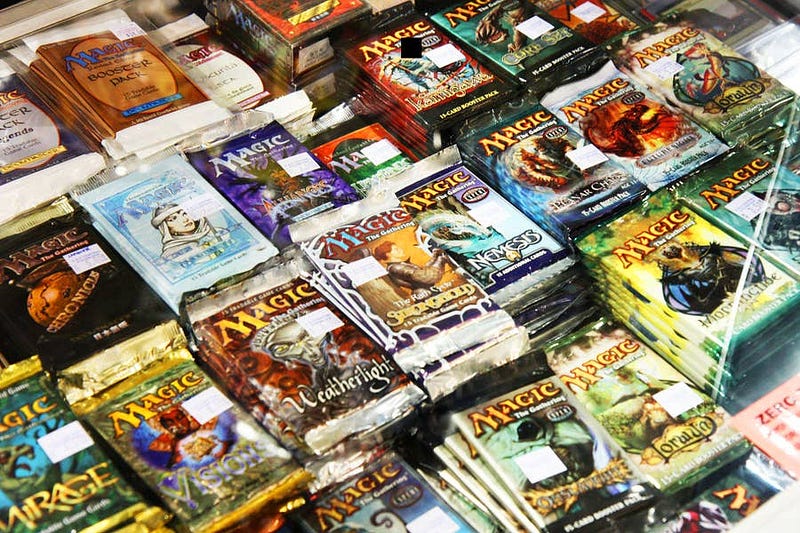
In the eight years between 2008 and 2016, over 20 billion Magic: The Gathering cards were produced. As of 2018, there were over thirty-five million players worldwide. This is the card game to end all card games, the trading card game realm’s alpha and omega.
Created in 1993 by Richard Garfield, MTG quickly became a rabid success, spawning whole generations of lookalike games and follow-up additions to the franchise. Thematically, the game resembles typical fantasy tropes.
However, the narrative aspect of pen and paper games is missing, replaced by the loose meta-construct of players being “Planeswalkers,” powerful magicians fighting one another with the spell and monsters in their decks.
I liked this game as a teen primarily because it provided a wide range of possible paths to victory, as well as an aesthetic I enjoyed. A massive range of decks could be constructed and, against non-professional players, a lot of fun could be had.
With something as popular as MTG, and with a host of peripheral narrative works, like novelizations, existing already, it could only be a matter of time before MTG took to the silver screen in some form or another.
Anime series: Magic: The Gathering (2023)
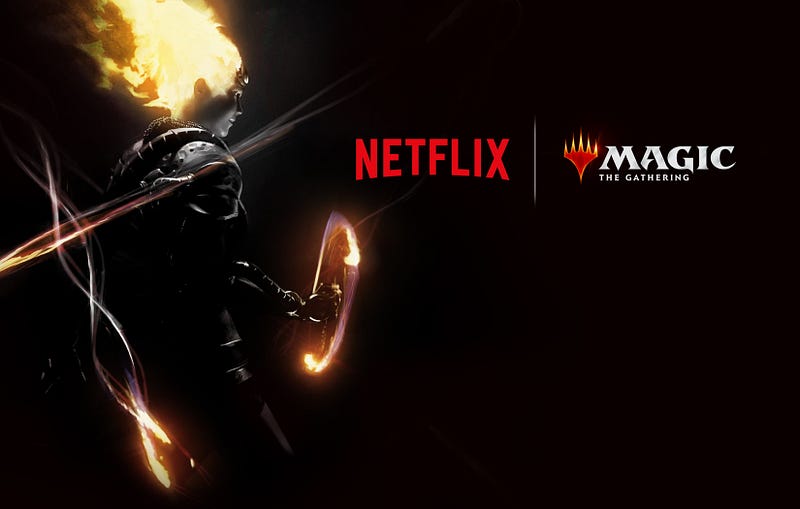
Since as early as 2008, there have been several potential deals to bring MTG to life somehow, but though there was headway on a film as recently as 2017, nothing managed to get finalized.
Not until 2019, anyway. In June 2019, Netflix announced that the Russo Brothers (who directed four Marvel films and were involved in the hit series Arrested Development) were primed to create an animated MTG series for the streaming service.
The series is due to be released in 2023, giving all MTG fans something to look forward to during year four of the COVID-19 pandemic.
Board game: Candy Land
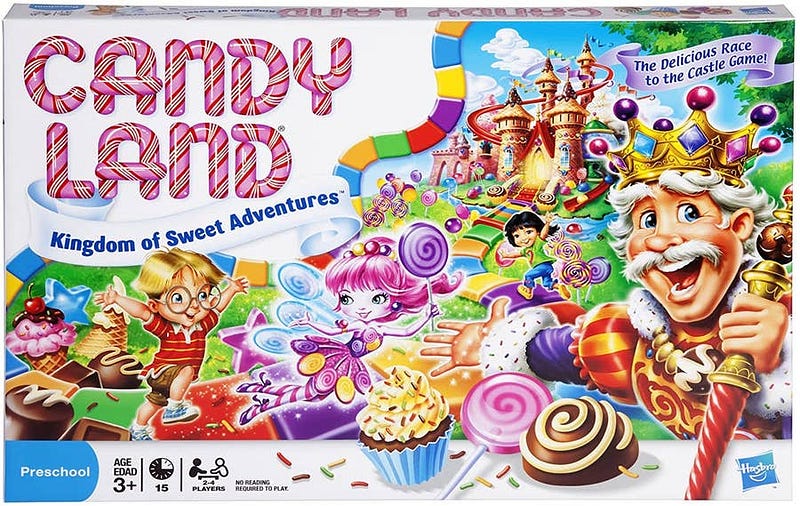
King Candy is missing, and all of Candy Land fears for his safety! Okay… so this game is not exactly a dramatic masterpiece. It is, however, a consistently well-selling game for your children, managing to sell around a million copies every year.
Candy Land is a straightforward racing game in which no choices are made, and the result is determined based on the initial card shuffle. It was designed by Eleanor Abbott in 1948 as she recovered from polio. She tested it by playing with kids in the same hospital wards, and it was those kids who actually suggested that Abbott publish it.
Movie: Candy Land: The Great Lollipop Adventure (2005)
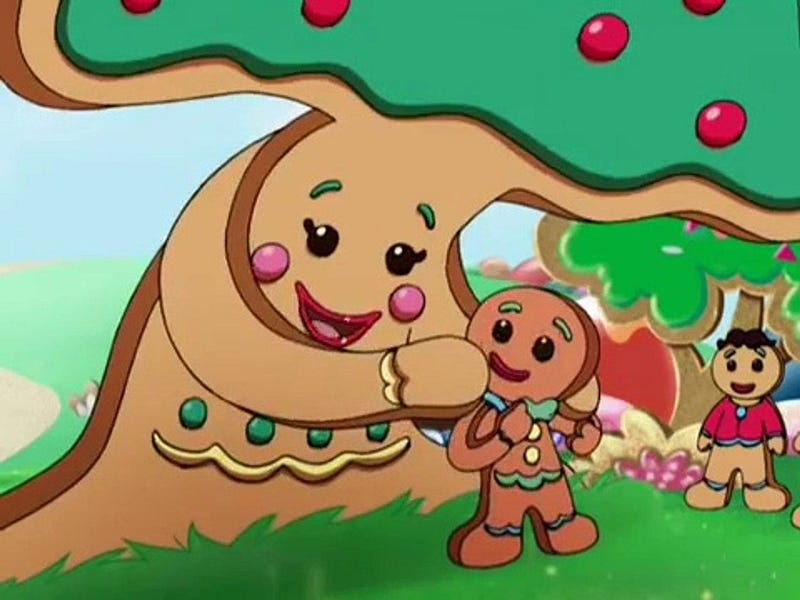
Evil Lord Licorice devises a plot to ruin Candy Land, but, luckily, a coalition of friends manages to stand against him and his plans while learning a little something about bravery and the true meaning of fun.
Weirdly, Ethan Cohen, who got his start writing scripts for BeevBeavis and Butthead, managed to land the writing role for this one (probably because he’d done other scripts like Madagascar, but come on, that’s just too good of a tidbit to pass up). As you might expect, this was a straight-to-DVD film, bypassing theaters altogether.
Board game: Chess (tournaments)
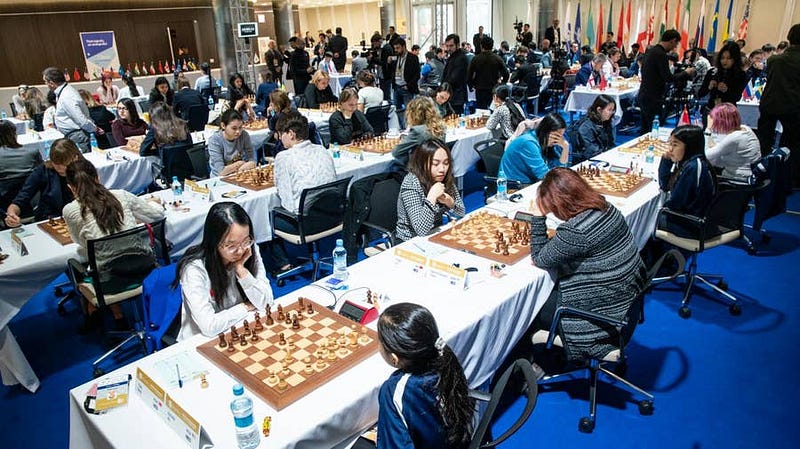
Okay, okay, I know — this is a bit of a cheat, but I really wanted to highlight this film. Plus, chess and chess tournaments are different, content-wise, right?
In 1925 Moscow hosted the first state-sponsored chess tournament, which featured teen Soviet chess masters and eleven foreign star players, including the chess world champion of the time, José Raúl Capablanca.
The tournament exploded the interest of Soviet citizens in chess, and drew tens of thousands of spectators who gathered around demonstration boards in downtown Moscow. The win by Soviet chess master Efim Bogoljubov was considered a win for Soviet Russia as a whole… until he left the Soviet Union and became a citizen of Germany (after which the USSR considered him a “renegade”).
However, the fie sparked by the tournament did not die down but flamed bright, so it makes perfect sense that some great media would have emerged from that first game.
Movie: Chess Fever (1925)
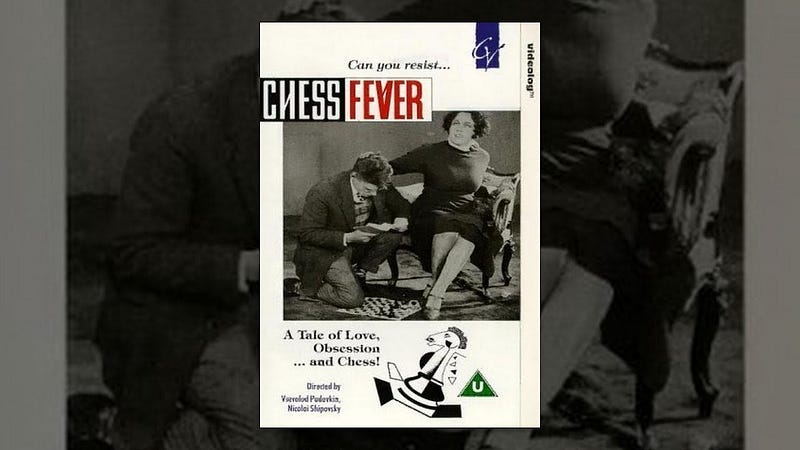
In the 1920s, Russian film produced some of the greatest silent work of the age, so, unsurprisingly, they would have produced a film about such a renowned event as the first international chess tournament. While chess is a game that many people are ardently passionate about, those passions are also a perfect breeding ground for humor.
Chess Fever plays on all the “chess obsession” tropes possible, as it tells the tale of a young couple caught by the passion of the game. The hero, obsessed with chess, loses his love, but she encounters chess master José Raúl Capablanca (played by himself) and, through a bizarre twist, discovers her own passion for the game. It’s a short and sweet film that manages to do humor in a way that nothing but silent films can.
Board game: Monopoly
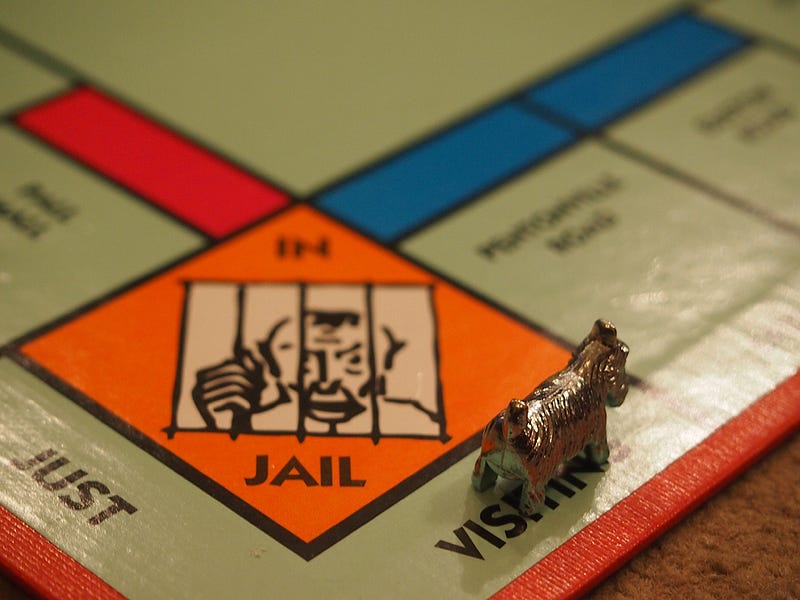
Okay, so we’ve all played Monopoly, right? We all know it’s a game about capital accumulation, domination, and cutthroat monopolizing, right? Wrong. So very, very wrong. Monopoly is one of my favorite games, not because I have actually played it since I was a kid, but because the story behind it is so dang interesting.
Created by Lizzie Magie in 1903, the game was an attempt to show how economies centered on wealth creation within structured and restricted frameworks is far preferable to unrestricted capitalism, basically the exact opposite of how the game is viewed today.
Magie’s original game was called The Landlord Game and concentrated on gaming elements of the then-popular economic theories of Henry George. She wanted a simple way to explain George’s single tax theory to the masses and felt that a game would be the best vehicle.
In a dark twist, a man named Charles Darrow stole the idea from Magie and claimed it as his own invention. While he managed to set himself up as the first millionaire game designer in history, Magie was left with around $500 in earnings for her creation and none of the credit, at least until her original patents were found.
Her own experiences seemed to viscerally showcase the competing ideas of economic theory that she tried to elucidate in her games, which I find both tragic and poignant.
Movie: TIE: Under The Boardwalk: The Monopoly Story (2010)
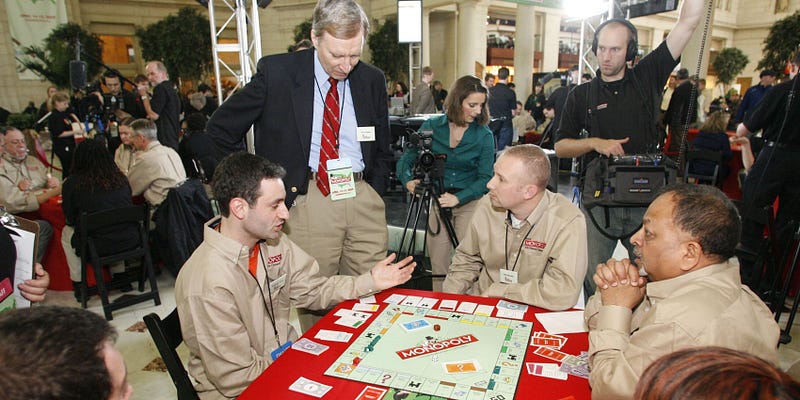
A documentary focused on the modern-day players and tournaments featuring Monopoly, TIE managed to win some awards and played well enough with critics and audiences to be moderately successful.
To date, aside from a game show, there’s not much media on the big screen dealing with this classic game (though Ridley Scott was set to direct a now-defunct film version). Sadly, TIE was pretty surface-level for such an interesting piece of history and mostly concentrated on several modern-day players as they prepare for the World Championship in Monopoly.
It’s light and relatively inconsequential, but still interesting enough for its view into the heart of American ideas of monetary exceptionalism and a culture of gamification exemplified by the Las Vegas setting.
